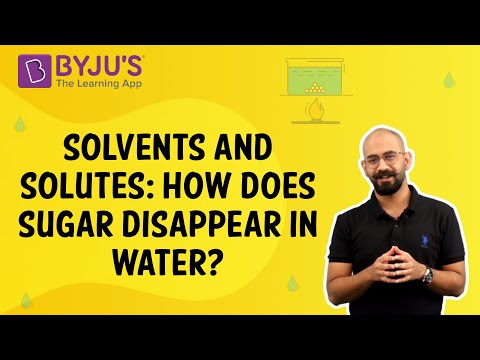What is a Solvent?
A solvent is a chemical substance that dissolves another chemical substance to form a solution of a homogeneous mixture. The solvent is the component in the solution that is present in the largest amount and determines the physicochemical form of the substance as either solid, liquid or gas. Solvents are usually but not necessarily always liquids and can also be gases or solids.
The organic solvents share a common structure; Organic solvents are both hydrophobic and hydrophilic in nature, volatile and of low molecular weight and exist in liquid form at room temperature. The solvent is the part that normally consists of more than 50 % of a solution, whereas the solvent is the part that is blended into the solvent. Typically, this is less than 50 % of the solution.
Solvent Classifications
Organic solvents and inorganic solvents are two types of solvents. Inorganic solvents don’t contain the element carbon. The most common inorganic solvents are water, and liquid ammonia whereas organic solvents, such as alcohols, glycol ethers, contain carbon and oxygen in their structure.
To Know About Solvents And Solutes, Watch The Below Video:

Solvents can be broadly classified into two categories: polar and nonpolar. A special case is mercury, whose solutions are known as amalgams; also, other metal solutions exist which are liquid at room temperature. Generally, the dielectric constant of the solvent provides a rough measure of a solvent’s polarity.
1. Polar Solvents
A polar solvent is a type of solvent that has large partial charges or dipole moments. The bonds between the atoms have very different but measurable electronegativities. A polar solvent can dissolve ions and other polar compounds.
Polar solvents are strong dipolar molecules that, as an interface form, also use hydrogen bonding. Polar solvents also often work by breaking the solute’s covalent bonds, inducing ionisation of the solute.
The most common solvents used in drug delivery systems are polar solvents, including, among others, water and alcohol. Other polar solvents, such as alcohols, aldehydes and sugar ketones and other compounds of -OH groups, are typical solutes for which polar solvents are used.
2. Nonpolar Solvents
Nonpolar Solvents possess little or no dipolar character. Although they tend to be unable to independently form dipoles, they can utilize induced dipole-induced dipole interactions for dissolving appropriate solutes.
Nonpolar solvents have dielectric constants between 1 and 20 and include fixed oils, carbon tetrachloride and chloroform among others. Ionic and polar solutes have little to no solubility in nonpolar solvents. However, oils, fats and fatty acids dissolve well in nonpolar solvents.
3. Aprotic Solvents
Aprotic solvents do not release protons , but may act either as a simple solvent , where polarity as measured by the dielectric constant is significant , or they may act as a proton acceptor i.e. aprotic basic. Aprotic solvents are polar compounds of liquid that contain no dissociable atoms of hydrogen. Chemical bodies such as O-H and N-H bonds are absent from these solvents. Therefore, hydroxyl groups (-OH) and amine groups (-NH2) are absent from aprotic solvents and are unable to form hydrogen bonds.
Aprotic solvents share with protic solvents the ability of ion dissolving. There is a lack of acidic hydrogen in these solvents, thus no major release of hydrogen ions. Polar aprotic solvents have dielectric constant values that are minimal or moderate. A moderate polarity is seen by these solvents.
4. Protic Solvents
A protic solvent is made up of molecules that may serve as donors of hydrogen-bonds. Examples of protic solvents contain water, alcohol, and carboxylic acids. Solvents that are unable to serve as donors to hydrogen-bonds are considered aprotic solvents. Examples of aprotic solvents include ether, methylene chloride and hexane.
Compounds that can be described by the general formula ROH are polar protic solvents. The polarity of the polar protic solvents occurs from the O-H bond dipole. Combined with the small size of the hydrogen atom, the large difference in the electronegativity of the oxygen and the hydrogen atom warrants the isolation of molecules comprising the OH group from those polar compounds which do not.
Frequently Asked Questions on Solvent Meaning
What do polar solvents dissolve?
Polar solvents dissolve polar solutes in general, and nonpolar solvents dissolve nonpolar solvents in general. This principle is often expressed as “Like dissolves like.” So many liquids dissolve in water that the universal solvent is often referred to as it.
Is water a polar solvent?
Because of the polarity of its own ions, water interacts differently with charged and polar substances than with nonpolar substances. Water molecules are polar, with partial hydrogen positive charges, partial oxygen negative charges, and a twisted overall shape.
What do non-polar solvents dissolve?
In chemistry, “like dissolves like” is a general law for deciding when a solvent dissolves a given solution. Solvents made up of polar molecules, such as water, dissolve other polar molecules, such as table salt, whereas nonpolar solvents, such as gasoline, dissolve nonpolar compounds such as wax.
Is water an aprotic solvent?
Air, ethanol, methanol, ammonia, and acetic acid among others are polar protic solvents. Polar aprotic solvents have no atoms of hydrogen directly bound to an electronegative atom and are not capable of bonding with hydrogen.
Which are organic solvents?
Chemical solvents are carbon-based compounds that are capable of dissolving one or more other compounds or dispersing them. N-hexane, tetrachloroethylene, and toluene contain organic solvents known as neurotoxins.
Is vinegar a solvent?
For one, vinegar is an acetic acid solution in water. It can be impossible to tell which substance is the solute and which is the solvent in a two-liquid solution. In addition, the solvent is the material found in the largest quantity. In vinegar, the solvent is water and the solute is acetic acid.

Comments